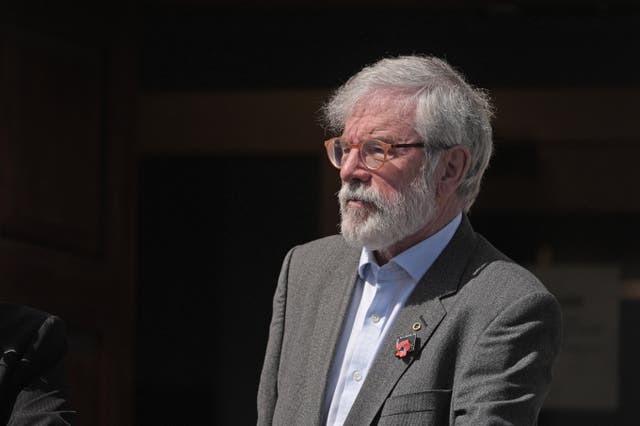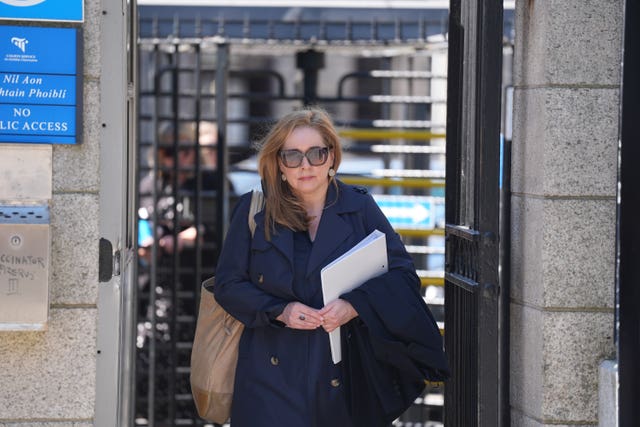BBC source on Adams claim would ‘likely be killed’ if identified, court told
Mr Donaldson was shot dead in 2006, months after admitting his role as a police and MI5 agent for 20 years.

It is “likely” a source who made allegations against Gerry Adams in a BBC documentary “would be killed” if they were identified, a journalist for the broadcaster has told a libel trial.
Mr Adams is suing the BBC over what he has deemed to be a “grievous smear” made by a confidential source in a Spotlight documentary that alleged he had sanctioned the killing of a former Sinn Fein official who turned out to be an informant.
He claims a BBC Spotlight programme, and an accompanying online story, defamed him by alleging he sanctioned the killing of Denis Donaldson, for which he denies any involvement.
The BBC argues the claim was corroborated by other sources and the reporter involved said the confidential source who made the allegation would likely be “killed” if their identity was revealed.
Mr Donaldson was shot dead in 2006, months after admitting his role as a police and MI5 agent for 20 years.
In 2009, the Real IRA claimed responsibility for the killing, and the Spotlight programme was broadcast in September 2016 while a garda investigation into the matter was ongoing.

In the programme, a man identified as “Martin” who says he was a former agent for Special Branch within the IRA, claims that the shooting was sanctioned by the political and military leadership of the IRA and said Mr Adams “gives the final say”.
Mr Adams’s legal team says his reputation as a “peacemaker” had suffered an “unjustified” attack because of the broadcast of the BBC programme, and the online article with the headline: “Gerry Adams ‘sanctioned Denis Donaldson killing’.”
At the High Court in Dublin on Tuesday, the BBC opened its defence and said it is “incomprehensible” to suggest that Mr Adams has a reputation solely as a peacemaker.
Eoin McCullough, SC, for the BBC, told the jury that the broadcaster fundamentally disputes what Mr Adams is putting forward as the meaning of the article.
He went on to say that whatever the proper meaning of the article or whether it was right or wrong, it was a proper piece of investigative journalism that was a fair and reasonable publication on a matter of public interest.
He told the jury even if they deem that that was not the case, that they should not award damages as Mr Adams had a reputation for being in the IRA and being on the Army Council and presiding over a campaign of violence in which many people were killed.
Mr McCullough said they should not award damages on the allegation that he had given the final word on “one more murder”.
He told the jury it was up to them to decide what an average reasonable person would understand the meaning of the broadcast and the article to be, adding that a reasonable person would read the whole article and not just the headline.
He said the BBC said the meaning of both was not that Mr Adams had sanctioned and approved the murder, and that the organisation had reported on an allegation and made clear that it was disputed by the former Sinn Fein leader.
He said the BBC would not take on the burden of proving the allegation as it did not present it as a fact.
Mr McCullough said there was an important issue of free speech and journalism in the case, adding that a journalist is entitled to publish materials in the public interest as long as they do so in good faith and act fairly and reasonably.

He said the Spotlight programme was thoughtfully made, carefully researched and was based on multiple sources.
On Mr Adams’s reputation, Mr McCullough said it was accepted by the plaintiff that allegations on his connection to the IRA and Army Council were reported on multiple times.
He said the jury had heard several pieces of evidence which point to Mr Adams having the reputation of being in the IRA.
“How can Mr Adams acknowledge he has a reputation of having been in the IRA, having been on the Army Council, having organised violence on that account – at the same time tell you ‘did you know my reputation is as a peacemaker?’.”
He said there were “red herrings” in the case, including what the jury thought of the legitimacy of a campaign of violence and how loyalists and the British Government acted.
Mr McCullough said Mr Adams had a reputation of being involved in violence, adding: “It makes no difference at all that ultimately peace was achieved.”
The BBC also called the main reporter in the documentary as a witness, who told the court that if the identity of Martin is revealed it is “likely that he would be killed”.
Jennifer O’Leary said it was “completely standard” to protect confidential sources in journalism and added: “It is rare to have a source where if his identity was revealed, it is likely that he would be killed.”
She told the court that the “last IRA informer” crucial to a defamation case, who she identified as Eamon Collins, was found dead on a road with his tongue cut out.
Ms O’Leary said the programme was made in the context of the murder of former IRA figure Kevin McGuigan in August 2015, adding that the then-PSNI chief constable George Hamilton had said the IRA was still in existence and that members had been involved in the murder.
She said Mr Adams had said that the organisation was off the stage and that no IRA members were involved.
She added that a PSNI and MI5 report from October of that year also said the IRA was still in existence.
Ms O’Leary said she first heard the assertion that the IRA was involved in the killing of Mr Donaldson in late 2015, from a man she told the court she would be identifying as “Republican Source B”.
This source, who she said was a former IRA operative, said the organisation would “let them make the claim” – referring to dissident republicans.
Ms O’Leary said she was later contacted by “Martin”, whose identity she said she knew but would not disclose, during the course of another programme on gangland activity in Dublin.
She said she was “really constrained” about what she could say without identifying him.
Ms O’Leary said she spoke about the IRA being behind the murder of Mr Donaldson, rather than dissident republicans.
She said she was able to verify details about him and his involvement in Sinn Fein, but his role as an informer created difficulty in “sussing out” some details.
She said she was sceptical but said details appeared to be credible.
Ms O’Leary said there was a “personal element to his motivation for speaking about” Mr Donaldson, and that this presents constraints for what she could say.
She went on to say that Martin had disclosed to security services that Mr Donaldson was taking documents out of Stormont, without knowing that he was an informer.
Ms O’Leary said it was “not true” to suggest she had any animus towards Mr Adams, adding: “I had no agenda whatsoever”.
She said she was aware that he had a widely reported reputation of being involved in the leadership of IRA which he had consistently rejected.
Prior to the BBC opening its defence, the jury was given as an exhibit a spreadsheet including agreed figures on the established viewership of the Spotlight programme in the Republic of Ireland.
These calculated that the documentary was viewed in 11,700 households in that jurisdiction, equating to an average viewership of roughly 15,800 individuals for any given minute of the 56-minute broadcast.
They were also told that it is believed the only article was viewed roughly 750 times between 2016 and 2017, but were advised that this figure would be checked and provided to them at a later date.
They were also shown a 12-minute montage containing 17 segments of news coverage of aspects of Mr Adams’s public life.
Judge Alexander Owens told the jury that this was being shown on balance as to an example of “good publicity” rather than as proof of the facts contained in the reports, after a separate montage was introduced earlier in the proceedings by the defence.
Mr Adams’s team closed its evidence with this montage, which showed him meeting with various taoisigh, US president Bill Clinton, South African president Nelson Mandela, his election as an MP, and shaking hands with Prince Charles as well as various other points in the peace process.
The case continues.





